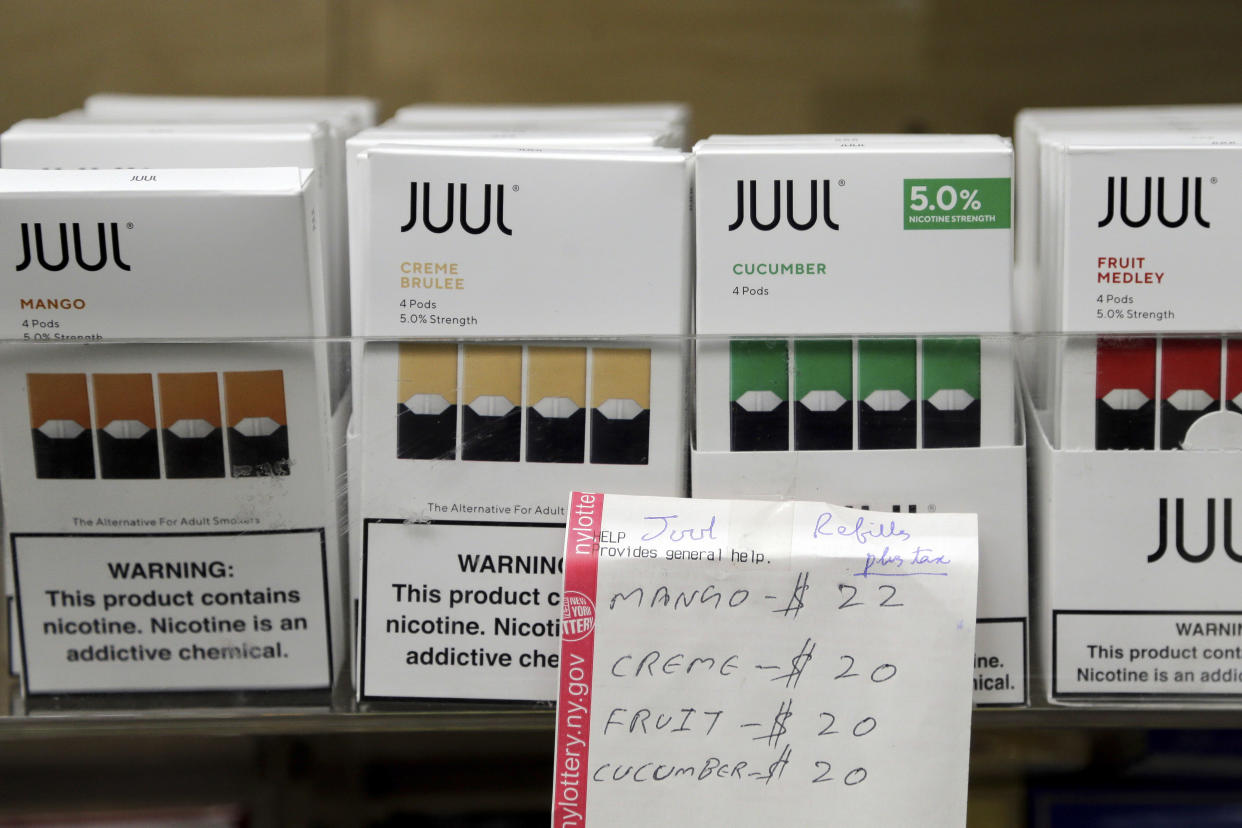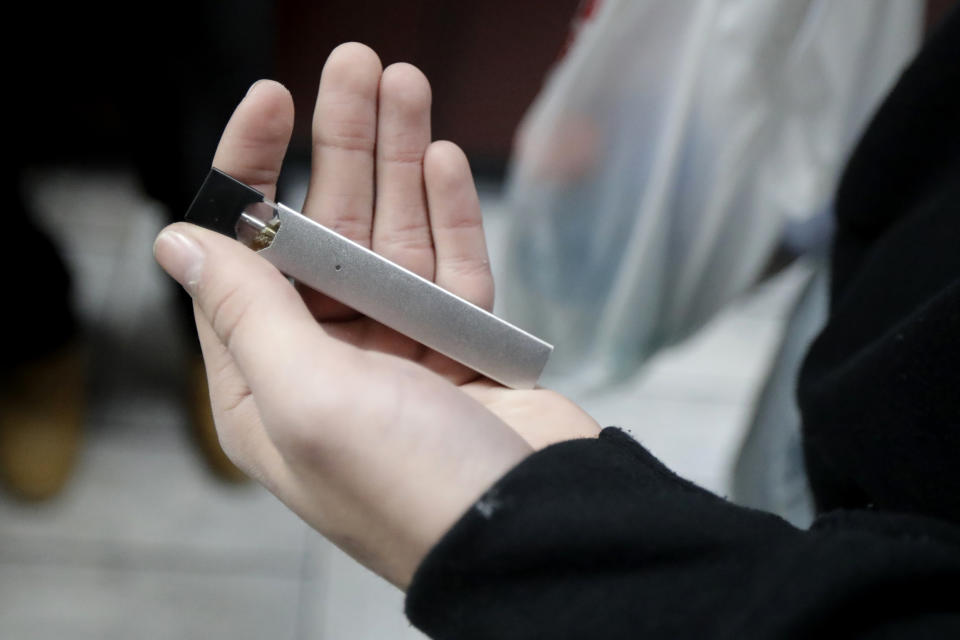Juul hit with wrongful death lawsuit after 18-year-old user's death is tied to 'breathing complications'

The first wrongful death lawsuit in America’s vaping crisis begins with a powerful statement which — in many ways — serves as a sobering snapshot of the epidemic as a whole. “Daniel David Wakefield was a healthy teenager whose life tragically and prematurely ended due to injuries that were directly caused by his addiction to Juul, an electronic nicotine-delivery system,” the complaint reads. “On August 31, 2018, Wakefield died in his sleep at the age of 18 after years of Juul use.”
Filed by Wakefield’s mother, Lisa Marie Vail, the case may prove to be historic — the first to demonstrate that e-cigarette and vaping companies may now be vulnerable to legal action from the families of victims. For Juul, one of many companies implicated in the crisis, it’s a problem that could get worse. According to the Centers for Disease Control and Prevention, 1,479, individuals have now been diagnosed with EVALI (e-cigarette or vaping product use-associated lung injury) and 33 have died. The condition causes a pneumonia-like illness with symptoms like shortness of breath, coughing, fever and vomiting.
While much discussion has focused on vaping products containing THC — which the majority of those with EVALI have reported using — the lawsuit is a reminder that e-cigarettes likely also play a role in the illnesses. So what does this latest development mean, and who are the players involved? Here’s what you need to know.
Juul is accused of intentionally making their product “attractive” to teens.
The complaint levels a multitude of allegations against Juul, saying that the company specifically targeted teens not only through colorful marketing but by characterizing it as a fun and “healthy alternative” to cigarettes. Lawyers write that the company intentionally made its product “attractive and palatable” to younger Americans and nonsmokers through products sold in “youth-friendly colors and pod flavors that minimize the harsh taste and discomfort of traditional smoking.”
The result, it alleges, is a spike in use among teenagers — for whom nicotine has proven most dangerous. Juul, it reads, “should have known” that their products were “dangerous and defective,” citing research that shows extremely high doses of nicotine in teens to be capable of “permanently altering the structure of the user’s developing brain,” as well as “caus[ing] harm to the airways, throat, and lungs.” All of these issues, it says, “can result in catastrophic, life-altering injuries.”
At the center of the lawsuit is Daniel David Wakefield, who died at 18.
The lawsuit goes into depth about 18-year-old Daniel David Wakefield, an “active healthy teenager” from Florida, who became severely addicted to Juul after being introduced to the product via social media, billboards, and direct marketing to his Gmail. Wakefield, once a student who “excelled” in school and was in the “gifted, advanced” program since elementary school, experienced a “significant decline” after starting Juul, which his mother says eventually caused his “emotional well-being” to be “substantially altered.” Plagued by mood swings and lack of focus, he dropped out of school and opted to take the GED instead. He continued buying the product, despite his mother’s pleas for him to stop, at convenience stores and online.
His addiction happened quickly, resulting in violence when Juul was removed.
The teen, according to the complaint, was convinced early on that Juul was not harmful. “Wakefield informed his mother that he read materials indicating JUUL was safe and did not pose the health risks that accompany combustible cigarettes,” the complaint reads. “He was unaware of its addictive properties and that it was unsafe for anyone under the age of 26.” The lawsuit says he was “attracted to” the products’ “candy-like flavors” and sleek design and that his addiction eventually turned violent. “[His mother] recalled an instance where Wakefield became enraged and threw a mini-refrigerator from the top floor of his home because he was angry about not being able to vape.”

Wakefield was hospitalized with breathing problems and died in his sleep.
After multiple failed attempts to quit, Wakefield was hospitalized less than a year after his vaping began, as a result of “breathing and lung complications.” In the hospital, the complaint reads, nurses found him to be so addicted that they “affixed nicotine patches to [his] skin” throughout his stay to make him more comfortable. Upon leaving the hospital, Wakefield was again inundated with advertisements through his Gmail account and began Juuling again. On the day before his death, he reportedly “help[ed] his mother move boxes in their home” before spending time with his friends. He spoke with his mother at 7 p.m. and she “did not detect any signs of labored breathing.” At 4 a.m. that morning, his father found him unresponsive at home. His death was “attributed to breathing complications” and has since had a “devastating impact” on his mother.
This isn’t the first time Juul has been accused of marketing directly to teens.
While Juul had yet to be implicated in a wrongful death suit, the case is far from the first to allege that the company’s marketing tactics are dangerous. The rapidly-growing startup has long been in hot water for its alleged targeting of teens, prompting the company’s CEO to step down in September, two months after testifying in front of Congress about their role in the “youth nicotine epidemic.” The lawsuit expands on the issues explored there, suggesting that the company fueled a spike in e-cigarette use among teens (which rose from 2.1 million in 2017 to 3.6 million in 2018 — an 80 percent increase in one year).
Lawyers for Wakefield’s case hope it will usher in change.
In an email with Yahoo Lifestyle, Mahzad K. Hite, an attorney representing Wakefield’s mom Vail and his estate, says he hopes this case will be a warning sign to others. “Daniel’s death was sudden and completely unexpected. No parent should have to face the death of their child, particularly one of Daniel’s age,” Hite tells Yahoo Lifestyle. “It is our hope that by bringing cases like that of Daniel Wakefield’s to light, the public becomes aware of the serious — and sometimes fatal — hazards of Juul vapor smoke. We also hope our work will trigger meaningful changes in Juul’s corporate conduct, including taking responsibility for its role in creating this epidemic amongst our youth.”
Juul has not responded to Yahoo Lifestyle’s request for comment.
Read more from Yahoo Lifestyle:
FDA links vaping to 127 seizures — expert says e-cigarettes can 'alter' teens' brains
Is vitamin E oil causing vaping-related lung illnesses? New York State Dept. investigates
Follow us on Instagram, Facebook and Twitter for nonstop inspiration delivered fresh to your feed, every day.

